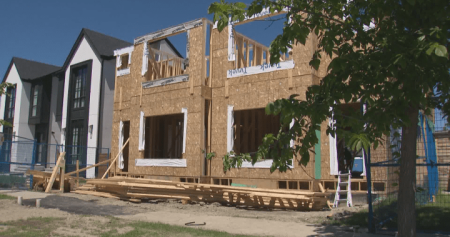A recent report commissioned by the City of Toronto highlights the complexities and challenges involved in converting the city’s surplus office spaces into residential units. While some past office conversions in Toronto have shown profitability, the majority do not provide sufficient investment returns to attract developers, complicating the notion of using these spaces to address the city’s critical housing shortage. This report challenges previous assumptions that repurposing empty offices could be a straightforward solution to high housing prices and rents, which have persisted despite a noticeable increase in office vacancies in the wake of the COVID-19 pandemic and the rise of hybrid work models. The document suggests that a more viable approach might involve demolishing existing office structures and constructing new developments on the cleared land, hinting that Toronto’s stringent office replacement policies may hinder the feasibility of conversions.
The report reveals the stark reality of Toronto’s escalating office vacancy rates, which reached 17.5% by the end of 2023. This figure marked a significant rise, illustrating the growing disconnect between office space demand and actual occupancy. Looking to other cities like Calgary, which successfully navigated similar challenges due to an oil and gas slump, Toronto’s city planners are being urged to reassess their existing policy frameworks. Calgary implemented a grant program that triggered rapid office-to-housing conversions, prompting Toronto to consider this approach. However, Toronto’s unique economic landscape and regulatory context may complicate the mimicry of Calgary’s success.
The analysis identifies critical flaws within Toronto’s office replacement strategy, particularly the requirement for developments in vital employment zones to maintain a minimum percentage of office space. This policy restricts the potential for meaningful conversion projects, with findings indicating that conversions become economically unfeasible once more than 25% of the original office space must be maintained. The report advocates for a recalibration of these guidelines, positing that the city should facilitate a more adaptable regulatory environment to support varied uses of the spaces being repurposed. Such changes could catalyze the transformation of vacant offices into affordable ownership and rental housing.
Most conversion efforts to date have primarily targeted “Class B” and “Class C” buildings, leaving “Class A” structures—typically located in prime areas like the Financial District—largely untouched due to their low return on investment in terms of conversion viability. It is also observed that new office developments akin to modern skyscrapers are impractical in today’s Toronto market. Conversely, smaller to medium-sized offices in strategic locations, particularly those in central corridors, present the best prospects for redevelopment. The report elucidates that should a fraction of these smaller office spaces be converted, there exists a potential to generate thousands of new housing units while simultaneously alleviating the oversupply of office space.
By focusing on the smaller and medium office offerings, the report highlights that revitalizing just 10% of these buildings could yield between 27,000 to 35,000 new residential units, significantly addressing the housing crisis. Furthermore, it underlines that alongside these new livelihoods, the city could maintain a degree of non-residential space to foster economic vitality. This dual approach emphasizes the need for a diverse mix of uses that not only fulfill housing demands but also enable continued business and community development.
In addition to its findings, the report presents a set of eight recommendations aimed at guiding policy adaptations. Among these, it suggests that the city should encourage a flexible, mixed-use redevelopment approach to foster an environment conducive to adaptation. Regular monitoring and updates to the city’s policies are deemed essential to ensure responsiveness to market dynamics. Given the ongoing fluctuations in supply and demand, it is urged that the city enables mechanisms to promptly adjust policies based on real-time assessments, allowing for agile responses tailored to the ever-evolving landscape of Toronto’s housing and commercial real estate markets. The planning committee will deliberate on these recommendations, potentially initiating further evaluations before implementing actionable strategies.










